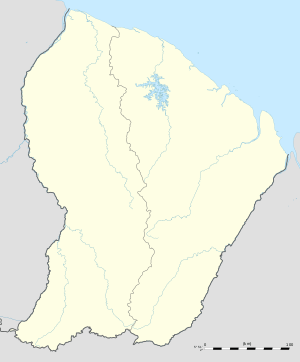Javouhey
Javouhey is a town in northwest French Guiana in the Mana commune of Saint-Laurent-du-Maroni. Most of its people are Hmong refugees from Laos who settled in French Guiana.[2] Javouhey was founded in 1978, as the second Hmong settlement village in French Guiana after Cacao. The village is on a former agricultural colony founded by Anne-Marie Javouhey in 1822.[2] The reasoning was that living, and working conditions were similar to their native land.[2] As of 2005, the village has a population of about 1,000 people.[1]
Javouhey | |
|---|---|
Town | |
 Javouhey Location in French Guiana | |
| Coordinates: 5°36′25″N 53°49′5″W | |
| Country | France |
| Overseas region | French Guiana |
| Arrondissement | Saint-Laurent-du-Maroni |
| Commune | Mana |
| Population (2005)[1] | |
| • Total | ~1,000 |
Overview
There are two primary schools, the new one just completed in 2006,[3] a Catholic church, and the biggest Protestant church in French Guiana.[4][5] There are three family owned stores, one with a gas station.[1] There is a Sunday market, where foods, souvenirs, and Hmong crafts can be purchase. In comparison to the Hmong villages in French Guiana; Javouhey is more so a traditional Hmong-Laos village, while Cacao - a more Hmong-French village. The contrast is in the area of lifestyle; clothing, home, and practice of tradition.[1]
The best time to visit Javouhey is during the week of Christmas, when the Hmong New Year's festival is held during the hot and dry season.[6] There is a French-owned Bungolow hotels a few minutes outside of Javouhey with minimum accommodation. Javouhey is about 2.5 km2 (1 sq mi) in size.[2] The economy is based on agriculture.[1]
References
- "Hmong Resettlement in French Guiana" (PDF). Hmong Studies. 2005. Retrieved 31 May 2020.
- "Des Hmongs en Guyane". ANAI Asso.org (National Association of Elders and Friends of Indochina) (in French). Retrieved 31 May 2020.
- "Les écoles". Mairie Mana (in French). Retrieved 31 May 2020.
- "Église Évangélique Hmong". Eglises.org (in French). Retrieved 31 May 2020.
- "Diocèse de Cayenne". Guyane.Catholique.org (in French). Retrieved 31 May 2020.
- "La fête du nouvel an Hmong au village Javouhey". France, la Première (in French). Retrieved 31 May 2020.
